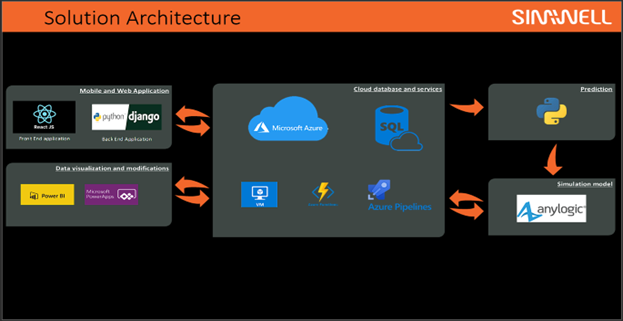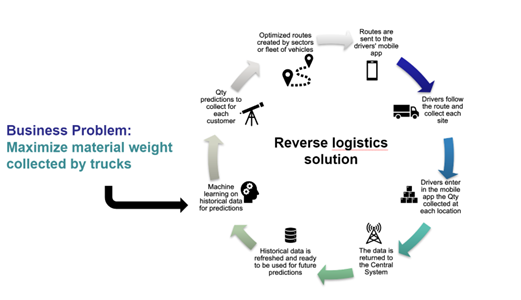Case Study: RPM eco uses end-to-end solution to Optimize Recycling Supply Chain
Overview
The RPM eco operates in the environmental field and is subject to many challenges as the input to its process is highly affected by seasonality and customer satisfaction. The main challenge was to fill the trucks available as efficiently as possible as well as prioritize the customers based on their profiles. SimWell used different expertise in order to build a complete solution going from the access and the availability of the data, to AI algorithms allowing to optimize and update input parameters, building routes according to multiple rules, to give direct access to the data to the end user of the solution through a mobile application and finally to access data visualization and analysis tools through a PowerBI interface. The results of the solution were almost instant when the solution was deployed and allowed the customer to greatly increase its service level.
Background
RPM eco offers recycling services going from the collection of recyclables to the transformation of the material and the water treatment linked to this transformation. They employ district managers that oversee operations in their region and rely on third-party carriers. Therefore the input of the whole process can be at risk because they don’t have direct control over the drivers which are paid accordingly to the volume they pick up. The company faces the following challenges in order to collect the recyclables:
- Difficult to predict which client will have products to collect
- Static routes create a lot of driving time
- The customer is not always close to the collection center.
- It can be challenging to maximize the efficiency of the available trucks.
- Increase the service level offered to their customers.
- Some of their customers have a high seasonality factor resulting in much variation from month to month.
The company has tried a few solutions before turning to simulation. There is no complete out-of-the-shelf solution that would get rid of all the challenges they are facing. SimWell has created a solution that addresses all the issues and increases profitability by being more efficient in its operations.
Solution
The solution developed by SimWell for the company is complex but reflects on their needs. The focal point of the solution is the Azure database where all the data from past and present is stored. Every part of the solution reads and in some cases can write in this database in order to keep live and updated data. In this cloud service, pipelines were created to facilitate data manipulation as well as verification and validation for the company to keep clean data.
AI algorithms were created to predict the volume of recyclables at each client every day. These algorithms are dynamically optimized every time a client is visited to ensure an accurate prediction.
The simulation model has a complex logic that is used to create routes for a given province. The model considers many province-specific data and uses a GIS map to build accurate routes based on the location of the customers. This simulation model is launched through a standalone version of an Anylogic model stored in an Azure virtual machine allowing the company to run it efficiently, from any location in the world regardless of their local computing capabilities.
The province-specific data can be modified through data visualization and data transformation tools built within PowerApps. These tools are available to the company and have many indicators helping them to take strategic decisions for the simulation model’s parameters. They can also visualize the end result of the model which are the different routes created and modify them if needed. They also have access to live data during the day for the different ongoing routes.
SimWell developed a mobile application in Django and React JS to allow the drivers to access their routes, obtain the location of the next customers and send data back to the cloud database as they progress. SimWell has developed a mobile app to capture operational data from the drivers. Each time routes are generated, drivers can access their routes for the week and plan ahead. Drivers have this application to enter everything they pick up from the customers to feed the algorithm and for accounting purposes.
This solution allows the company to operate a digital twin highly automated that not only reduces the carbon footprint of the trucks by being more efficient on the road but saves a lot of money in non-added value tasks for the administration.

The Outcome
There are 3 key indicators that RPM eco monitors in order to evaluate the performance of the system which are the number of empty pick-ups, the number of service calls, and the average weight per pick-up.
The solution built by SimWell allowed the client to gain a better vision of their operations, to increase their level of service and customer satisfaction as well as their driver satisfaction. The solution minimizes the risk of having a low volume in the routes and reduces greatly the time needed by the drivers to pick up the same weight as they were used to pick up.
The average weight per pick-up across all provinces has increased by 30%. The number of service calls has greatly reduced and the number of empty pick-ups has decreased by as much as 90% in some provinces.
This allows RPM eco not only to increase its production capacity but also gives him some leverage when it will come time to negotiate with its third-party carriers and therefore reduce its operational costs.
The case study was presented by Shirwa Mahdi, Maxime Leclerc, Joseph Moyer, David Larivee, of SimWell, at the AnyLogic Conference 2022, slides are available here.
RPM eco case study is also available on the AnyLogic website.
With simulation and optimization solutions built by SimWell, you will save time and money by avoiding costly mistakes. Call us now to see how we can help you to get the best out of your warehouses.






